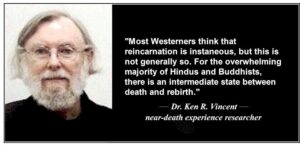This site uses affiliate links to Amazon.com Books for which IANDS can earn an affiliate commission if you click on those links and make purchases through them.
1. Universalism in Hinduism
Hinduism and its children — Buddhism, Sikhism, and Jainism — allow for the potential for ALL to be saved.
Hinduism is very diverse, but all Hindus believe in the Law of Karma. Karma means that good actions bring good results and evil actions bring evil results, i.e., your actions in this life determine your fate in the afterlife and reincarnation. For Hindus, union of the soul (Atman) with the Most High God (Brahman) is the ultimate goal. Although the Atman and Brahman are of the same substance, the soul retains its identity when it unites with Brahman (Moksha) in virtually all denominations of Hinduism. It is analogous, they say, to a drop of water (the soul) that unites with the ocean (God) but always knows it is a drop of water. This concept is retained in most forms of Buddhism but changes in some sects of Theravada Buddhism which claims that the soul loses its identity in God (the Infinite), as stated by John Hick his book, Death and Eternal Life.
In Hinduism, the high God (Brahman) is beyond form, but is manifest in many forms (gods). After all, how is God manifest to a hamster? Here are some Hindu verses that speak to this:
“Whatever form any devotee with faith wishes to worship Me, I make that faith of his steady” (Bhagavad-Gita 7.21).
“Whosoever offers to Me with devotion a leaf, a flower, a fruit, or water-that offering of Love, of the pure-hearted I accept” (Bhagavad-Gita 9.29).
“By Me is pervaded all this universe, by Me in the form of the unmanifest. All beings rest in Me, and I do not rest in them” (Bhagavad-Gita 9.4).
2. Universalism in Buddhism
Buddhism does not deal with God per se, but rather is a “fast track” salvation system of the reincarnation type which allows for the Buddhist to attach him/herself to other religions such as the shamanic Bon religion of Tibet, Daoism in China, or the Shinto religion in Japan.
Most Westerners think that reincarnation is instantaneous, but this is not generally so. For the overwhelming majority of Hindus and Buddhists, there is an intermediate state between death and rebirth. This intermediate state is presided over by Yama or Yamaraj. In Hindu mythology, Yama was the first king and king of the dead. His assistants weigh your good deeds and bad deeds and, depending on the outcome, send you to Heaven or Hell for three generations. Other Hindus assert that Karma is constantly reassessed on a sort of “Karma credit card,” and that the length of your stay in Heaven or Hell is determined by how much “good” or “bad Karma you have “charged.” Obviously your Karma also determines your fate regarding reincarnation.
Saviors (avatars) are also a part of Hinduism. Dying with the name of Vishnu or one of his incarnations on your lips (such as Rama or Krishna), assures that all of your sins will be taken away and you advance directly to paradise. The last words of Gandhi were, “Rama, Rama.”
In Buddhism, as in its parent religion, Yama judges the dead. Yama is known as “Yama” in Tibet, Nepal, Southeast Asia and Western China. In Eastern China, Korea, and Japan, his name changes, but he is always the same fair judge of the dead. Although he is the king of Heaven in Hinduism, he presides over Hell in Buddhism. In the Tibetan Book of the Dead, a twelfth-century Buddhist work, the intermediate state before rebirth lasts 49 days.
In Pure Land Buddhism, by invoking the name of the “savior” Bodhisattva Amitabha Buddha at death, you will be transported to a Pure Land of Bliss by Amitabha (the Buddha of Infinite Light), who is also known as O-Mi-To (China) and Amida (Japan). Once there, you can continue the process of liberation under blissful conditions for as long as it takes. Other Pure Land Savior Bodhisattvas include Ti-tsang and Guanyin (Khuan-Yin) the female Bodhisattva of Compassion.
3. Universalism in Sikhism and Jainism
The other children of Hinduism — Sikhism and Jainism — also have a judgment after death by Yama (king of the Dead), reincarnation, and the potential for ALL to achieve union with God (the Infinite).
Sikhism is a merger of Islam and Hinduism that developed in the 16th Century when its founder, Guru Nanak, had a revelation from God. The god of the Sikhs is a personal god, much like the god of the Abrahamic religions; however, the Sikh salvation system is the Hindu model of reincarnation in which ALL have the potential to reach the highest state:
“‘How then is truth to be attained? How is the veil of illusion to be destroyed? Nanak says, ‘through obedience to the divine order, which is written in your heart.'”
Jainism is a religion of the “axial age” (6th Century BCE), when Mahavira, the last of its twenty-four “holy ones,” appeared. Hindus and religious scholars see Jainism as an off-shoot of Hinduism, but some Jains maintain that it evolved independently. Jains see the Universe as having always existed, but having different eons or ages. Humans reincarnate through heavens, earth, and hells, but ALL have the possibility of reaching the infinite.
So we see that Universalism is fundamental to the ancient religion of Hinduism and its children. Hell is not permanent in the intermediate state between death and rebirth, and the process of reincarnation allows for ALL to ultimately unite with God (the Infinite).
Some years ago, I was attending a Hindu workshop for teachers, and they talked about their religious “children,” namely, Buddhism, Sikhism, and Jainism. I can’t recall if there was a Jain in attendance, but I do remember talking at length with the Sikh who presented that day. Can you imagine this happening with Western religions? Think of a Zoroastrian conference where Jews, Christians and Muslims show up and congenially admit that Zoroastrianism is the basis for all three of their religions!










